五年级科普英语
小学英语科普版上册知识点整合-五年级
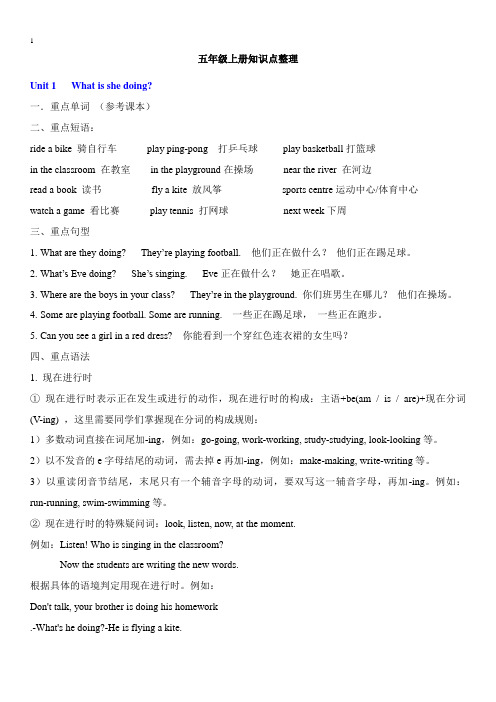
五年级上册知识点整理Unit 1 What is she doing?一.重点单词(参考课本)二、重点短语:ride a bike 骑自行车play ping-pong 打乒乓球play basketball打篮球in the classroom 在教室in the playground在操场near the river 在河边read a book 读书fly a kite 放风筝sports centre运动中心/体育中心watch a game 看比赛play tennis 打网球next week下周三、重点句型1.What are they doing? They’re playing football. 他们正在做什么?他们正在踢足球。
2.What’s Eve doing? She’s singing. Eve正在做什么?她正在唱歌。
3.Where are the boys in your class? They’re in the play ground. 你们班男生在哪儿?他们在操场。
4.Some are playing football. Some are running. 一些正在踢足球,一些正在跑步。
5.Can you see a girl in a red dress? 你能看到一个穿红色连衣裙的女生吗?四、重点语法1. 现在进行时①现在进行时表示正在发生或进行的动作,现在进行时的构成:主语+be(am / is / are)+现在分词(V-ing) ,这里需要同学们掌握现在分词的构成规则:1)多数动词直接在词尾加-ing,例如:go-going, work-working, study-studying, look-looking等。
2)以不发音的e字母结尾的动词,需去掉e再加-ing,例如:make-making, write-writing等。
3)以重读闭音节结尾,末尾只有一个辅音字母的动词,要双写这一辅音字母,再加-ing。
五年级下册科普版英语六篇小作文

五年级下册科普版英语六篇小作文Science has always been a fascinating subject for students, and in the fifth grade, students are introduced to a range of scientific concepts in the form of interactive and engaging lessons. In the second semester of the fifth grade, students delve deeper into various scientific topics, and this includes learning about the wonders of space, the different forms of energy, our environment, and more. In this essay, we will explore six small compositions based on the scientific knowledge that students acquire in the second semester of the fifth grade.1. The Solar SystemThe solar system is a vast and intriguing topic that captivates students of all ages. In the fifth grade, students learn about the eight planets in our solar system, their order from the sun, and interesting facts about each one. They also learn about the asteroid belt, comets, and other celestial objects. The study of the solar system sparks curiosity and wonder in students, encouraging them to explore the universe beyond our planet.2. Forms of EnergyEnergy is a fundamental concept in science, and students in the fifth grade learn about the different forms of energy thatexist in our world. They study potential energy, kinetic energy, thermal energy, light energy, and more. Through hands-on experiments and real-world examples, students understand how energy is transferred and transformed in various processes. This knowledge helps students appreciate the importance of energy conservation and sustainable practices.3. The Water CycleThe water cycle is a crucial process that sustains life on Earth, and students in the fifth grade learn about its different stages - evaporation, condensation, precipitation, and collection. They also study the role of oceans, rivers, lakes, and clouds in the water cycle. Through activities and diagrams, students gain a deeper understanding of how water circulates through the environment, providing essential resources for plants, animals, and humans.4. Ecosystems and BiodiversityEcosystems are complex networks of living organisms and their physical environments, and students in the fifth grade explore the diverse ecosystems present on our planet. They learn about food chains, habitats, and the interdependence of species within an ecosystem. Students also study biodiversity, understanding the importance of preserving different species tomaintain ecological balance. Through discussions and projects, students realize the significance of protecting natural habitats and promoting biodiversity conservation.5. Earth's ResourcesEarth is abundant in natural resources that support human civilization, and students in the fifth grade discover the various types of resources available on our planet. They learn about renewable resources such as sunlight, wind, and water, as well as non-renewable resources like fossil fuels and minerals. Students explore the concept of sustainable development, understanding the importance of using resources responsibly to meet current needs without compromising future generations.6. Environmental IssuesEnvironmental issues such as pollution, deforestation, and climate change are pressing challenges that students in the fifth grade learn about in the second semester. They study the causes and consequences of these issues, as well as possible solutions to address them. Through research projects and discussions, students develop awareness of their impact on the environment and the actions they can take to protect the planet for future generations.In conclusion, the second semester of the fifth grade introduces students to a wide range of scientific topics that deepen their understanding of the natural world. Through engaging lessons, hands-on activities, and real-world examples, students develop a sense of curiosity, wonder, and responsibility towards the environment. By exploring the wonders of space, understanding the different forms of energy, and learning about ecosystems and environmental issues, students in the fifth grade embark on a journey of scientific discovery that shapes their knowledge and perspectives for years to come.。
五年级科普英语(共9张PPT)
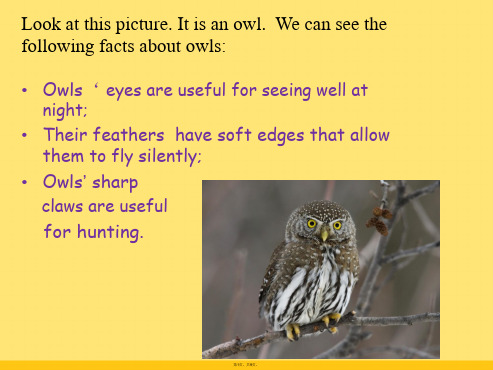
1.The porcupine uses its quills for defense.
2. A turtle’s shell protects
it from being eating by other animals.
They are both physical adaptations.
adaptations. They are both physical adaptations.
Their feathers have soft edges that allow them to fly silently; Animals hibernate to conserve energy and avoid a food shortage. Animals hibernate to conserve energy and avoid a food shortage. Some adaptations have to do with an animal’s acts or behaves. It is an owl. Each living thing uses its adaptations for survival. For example, Most birds migrate to find food and a place to lay eggs. for hunting.
Look at this picture. It is an owl. We can see the following facts about owls:
• Owls‘ eyes are useful for seeing well at
night;
• Their feathers have soft edges that allow them to fly silently;
五年级英语科普知识基本词汇

五年级英语科普知识基本词汇一、动物类1. Animal - 动物2. Mammal - 哺乳动物3. Reptile - 爬行动物4. Amphibian - 两栖动物5. Bird - 鸟类6. Fish - 鱼类7. Insect - 昆虫8. Herbivore - 食草动物9. Carnivore - 食肉动物10. Omnivore - 杂食动物二、植物类1. Plant - 植物2. Flower - 花3. Tree - 树4. Leaf - 叶子5. Stem - 茎6. Root - 根7. Fruit - 水果8. Seed - 种子9. Photosynthesis - 光合作用10. Pollination - 授粉三、天气类1. Weather - 天气2. Sunny - 晴天3. Cloudy - 多云4. Rainy - 下雨5. Snowy - 下雪6. Windy - 多风的7. Stormy - 暴风雨8. Temperature - 温度9. Humidity - 湿度10. Forecast - 天气预报四、学科类1. Science - 科学2. Mathematics - 数学3. English - 英语4. History - 历史5. Geography - 地理6. Art - 艺术7. Music - 音乐8. Physical Education - 体育9. Chemistry - 化学10. Physics - 物理五、地点类1. School - 学校2. Classroom - 教室3. Library - 图书馆4. Park - 公园5. Zoo - 动物园6. Beach - 海滩7. Museum - 博物馆8. Cinema - 电影院9. Restaurant - 餐厅10. Hospital - 医院六、家庭类1. Family - 家庭2. Father - 父亲3. Mother - 母亲4. Brother - 兄弟5. Sister - 姐妹6. Grandparents - 祖父母7. Uncle - 叔叔8. Aunt - 阿姨9. Cousin - 堂兄弟/堂姐妹10. Pet - 宠物七、食物类1. Food - 食物2. Fruit - 水果3. Vegetable - 蔬菜4. Meat - 肉类5. Rice - 米饭6. Bread - 面包7. Milk - 牛奶8. Water - 水9. Juice - 果汁10. Snack - 小吃以上是五年级英语科普知识基本词汇,掌握这些词汇将有助于扩大英语词汇量,并能更好地理解科学、自然和日常生活中的各种事物。
五年级下册英语科普版单词表

Unit 1: Nature and Environmentenvironment - 环境nature - 自然plant - 植物flower - 花tree - 树leaf - 叶子grass - 草soil - 土壤water - 水air - 空气climate - 气候pollution - 污染Unit 2: Animals and Habitatsanimal - 动物habitat - 栖息地mammal - 哺乳动物bird - 鸟reptile - 爬行动物amphibian - 两栖动物fish - 鱼insect - 昆虫prey - 猎物predator - 捕食者Unit 3: Human Bodyhuman body - 人体head - 头face - 脸eye - 眼睛ear - 耳朵nose - 鼻子mouth - 嘴skin - 皮肤hand - 手foot - 脚Unit 4: Science and Technology science - 科学technology - 技术invention - 发明computer - 电脑robot - 机器人phone - 电话internet - 互联网experiment - 实验scientist - 科学家engineer - 工程师第一单元:自然与环境环境 - environment自然 - nature植物 - plant花 - flower树 - tree叶子 - leaf草 - grass土壤 - soil水 - water空气 - air气候 - climate污染 - pollution第二单元:动物与栖息地动物 - animal栖息地 - habitat哺乳动物 - mammal鸟 - bird爬行动物 - reptile两栖动物 - amphibian 鱼 - fish昆虫 - insect猎物 - prey捕食者 - predator第三单元:人体人体 - human body头 - head脸 - face眼睛 - eye耳朵 - ear鼻子 - nose嘴 - mouth皮肤 - skin手 - hand脚 - foot第四单元:科学与技术科学 - science技术 - technology 发明 - invention电脑 - computer机器人 - robot电话 - phone互联网 - internet 实验 - experiment 科学家 - scientist 工程师 - engineer。
五年级科普英语知识点总结

五年级科普英语知识点总结1. The Solar SystemOne of the most captivating areas of science for fifth graders is the study of the solar system. The solar system consists of the sun, eight planets, and numerous other celestial bodies such as moons, asteroids, and comets. Learning about the solar system can help you to understand the size and scale of the universe, as well as the unique characteristics of each planet. For example, you can learn about the different temperatures, atmospheres, and surface features of planets like Mercury, Venus, Earth, and Mars.2. The Water CycleAnother important topic in science is the water cycle, which is the continuous movement of water on, above, and below the Earth's surface. Understanding the water cycle can help you to learn about the processes of evaporation, condensation, precipitation, and runoff. You can also learn about the roles that the sun, clouds, and various forms of precipitation play in the water cycle.3. Energy and ElectricityIn fifth grade, you can start to learn about the basics of energy and electricity. This includes understanding the different forms of energy, such as heat, light, sound, and electrical energy. You can also learn about how electricity is generated and how it can be used to power various devices and appliances. Additionally, you can learn about the importance of energy conservation and how to reduce your energy consumption.4. Animal ClassificationLearning about animal classification is another important part of fifth-grade science. You can learn about the different types of animals, including mammals, birds, reptiles, amphibians, and fish. You can also learn about the unique characteristics of each animal group, such as their body coverings, modes of reproduction, and methods of obtaining food. Studying animal classification can help you to develop a deeper understanding of the diversity of life on Earth.5. The Scientific MethodFinally, it's important for fifth graders to learn about the scientific method, which is a systematic way of investigating and understanding the natural world. The scientific method involves making observations, asking questions, forming hypotheses, conducting experiments, and drawing conclusions. Learning about the scientific method can help you to develop critical thinking skills and a greater appreciation for the process of scientific discovery.In conclusion, there are many fascinating and important science topics for fifth graders to learn about. From the solar system to the water cycle to animal classification, there arecountless opportunities for you to develop a deeper understanding of the natural world and the principles that govern it. By studying these topics, you can develop a lifelong love of science and gain a greater appreciation for the wonders of the universe. I hope this summary of key science topics has inspired you to continue your exploration of the world of science!。
五年级上册英语课文科普版

五年级上册英语课文科普版一、单词部分。
1. 单词分类记忆。
- 按照单元主题分类,例如如果第一单元是关于学校的,将school(学校)、classroom(教室)、teacher(教师)、student(学生)等单词归为一类。
这样有助于在描述学校场景时联想记忆单词。
- 按照词性分类,像名词(noun):book(书)、desk(书桌);动词(verb):read(读)、write(写);形容词(adjective):big(大的)、small (小的)等。
2. 单词记忆技巧。
- 利用自然拼读法。
例如,“cat”这个单词,c发/k/音,a发/æ/音,t发/t/音。
对于一些符合发音规则的单词,通过自然拼读可以快速准确地记忆。
- 制作单词卡片。
在卡片的一面写单词,另一面写单词的释义、例句或者音标。
可以随时随地拿出来复习,自我测试。
3. 重点单词举例。
- 课本中可能会有一些日常活动相关的重点单词,如“get up(起床)”“go to school(去上学)”“have lunch(吃午饭)”等。
这些单词在描述日常作息时经常用到。
二、语法部分。
1. 一般现在时。
- 概念:表示经常发生的动作或存在的状态。
例如:I go to school every day.(我每天去上学。
)- 动词形式:当主语是第三人称单数(he/she/it等)时,动词要加 -s或 -es。
如:He likes reading books.(他喜欢读书。
)- 句型结构:肯定句:主语+动词原形(第三人称单数加 -s或 -es)+其他;否定句:主语+don't/doesn't+动词原形+其他;一般疑问句:Do/Does+主语+动词原形+其他?2. There be句型。
- 概念:表示“某地有某物”。
例如:There is a book on the desk.(桌子上有一本书。
)- 用法:be动词的形式取决于后面的名词是单数还是复数。
科普版英语五年级上册第一课讲解

科普版英语五年级上册第一课讲解课文翻译露露:嗨,汤姆!伊芙在哪?汤姆:她在教室里。
露露:她在做什么?汤姆:她正在唱歌。
露露:你们班的男生在哪里?汤姆:他们在操场上。
露露:他们在做什么?汤姆:一些男孩正在踢足球。
一些男孩正在跑步。
Read翻译去体育中心。
今天是星期天。
迈克和他的家人在体育中心。
迈克和他的妹妹吉尔正在玩球类游戏。
迈克在踢足球,吉尔在打乒乓球。
迈克的父亲,格林先生,喜欢马。
他骑着一匹马。
这匹马跑得很快。
迈克的妈妈,格林夫人,正在看篮球比赛。
迈克的爷爷和奶奶正在打网球。
下周他们将和他们的朋友进行一场比赛。
第一课的重点是--现在进行时主要掌握现在进行时结构:be+动词ing以及现在进行时动词的变化规则:1.一般直接加-ing2.以不发音字母e结尾的,去e加ing3.以重读闭音节结尾的且末尾只有一个辅音字母,双写最后的辅音字母,再加+ing。
4.以ie结尾的,改ie为y,再加+ing。
5.以c结尾的,变c为ck,再加+ing。
listen and say 中注意一句话a girl in a red dress 穿红裙子的女孩这里穿什么衣服介词用的是in做题易错点1.现在进行时的be动词一定不能忘记,并且一定要随主语变化She is singing.They are playing basketball.主语不同,be动词也不同2.动词的现在分词(动词+ing)run-running 不能写成runing变化规则一定要掌握持续更新中,欢迎关注~。
科普版-英语-五年级上册-科普版五年级上册

第二个词,问谁答谁。第三个词,用什么问用什 么答。
对划线部分提问变否定句变一般疑问句 1.Eve is dancing in the classroom. What is Eve doing in the classroom? Eve is not dancing in the classroom. Is Eve dancing in the classroom? 2.Jim likes swimming. What does Jim like? Jim doesn't like swimming. Does Jim like swimming?
on the island在岛上 be called被称为...
12.by the way顺便问一下 near here这附近 at home在家 buy/get sb sth=buy/get sth for sb 买/取给某人某物=买/取某物给某人
knock at敲... of course当然 call the police报 警
动词单三,名词变复数变化规则:
一般直接加s。二般以s,x,ch,sh,o结尾的加es 三般辅音加y结尾的变y为i再加es。羊sheep,鹿
deer,鱼fish,人,人们people 单复数同形。 现在分词/动词的ing形式变化规则: 一般直接加ing。二般以哑音e结尾的,去e再加
ing。 三般一元一辅结尾的,双写尾字母再加ing。 be(am,is,are),like后跟动词的ing形式 情态动词can,助动词do/does后跟动词原形
give sb sth=give sth to sb 给某人某物=把某物给某人
9.how much多少(钱) What can I do for you?我能帮你做什么吗? a kilo of一千克... half a kilo of半千克... two kilos of两千克... in all一共,总共
五年级下册英语科普版第一课单词
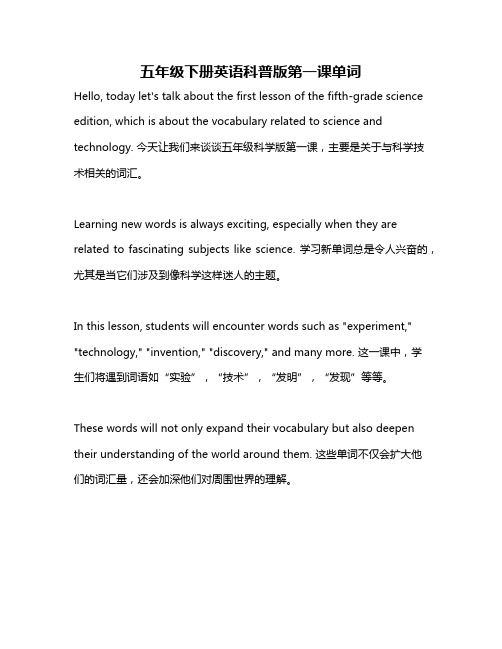
五年级下册英语科普版第一课单词Hello, today let's talk about the first lesson of the fifth-grade science edition, which is about the vocabulary related to science and technology. 今天让我们来谈谈五年级科学版第一课,主要是关于与科学技术相关的词汇。
Learning new words is always exciting, especially when they are related to fascinating subjects like science. 学习新单词总是令人兴奋的,尤其是当它们涉及到像科学这样迷人的主题。
In this lesson, students will encounter words such as "experiment," "technology," "invention," "discovery," and many more. 这一课中,学生们将遇到词语如“实验”,“技术”,“发明”,“发现”等等。
These words will not only expand their vocabulary but also deepen their understanding of the world around them. 这些单词不仅会扩大他们的词汇量,还会加深他们对周围世界的理解。
By learning these words, students will be able to better communicate their ideas and thoughts about scientific concepts. 通过学习这些单词,学生们将能够更好地传达他们对科学概念的想法和见解。
2023年科普版五年级英语上册全册知识点汇总

科普版五年级英语上册全册知识点汇总Lesson 1 What is she doing?一、关键词汇1. 名词: playground操场 sport运动 grandfather爷爷,外公(口grandpa) grandmother奶奶,外婆(口grandma) week星期classroom教室 centre中心 ping-pong乒乓球 tennis网球2. 形容词: next下一种3. 动词: love爱4. 短语: play football踢足球 play ping-pong打乒乓球have a match比赛二、理解词汇1. 名词: bike 自行车basketball篮球baseball棒球softball垒球handball手球 hockey曲棍球 volleyball排球 fencing击剑2. 动词: ride骑 dance跳舞 swim游泳 wear穿 run跑 walk 走jump 跳 sing唱 read读 draw画 watch看三、关键句型1. —Where is Eve? 伊芙在哪里?—She’s in the classroom. 她在教室里。
解读: 问句是一种由where 引导旳特殊疑问句,用来问询他人旳位置。
举一反三: —Where is Tom? 汤姆在哪里?—He’s in the house. 他在房子里。
—Where is Ann? 安在哪里?—She’s in the garden. 她在花园里。
2. —What is she doing? 她正在做什么?—She’s singing. 她正在唱歌。
解读: 问句是一种具有目前进行时并由what引导旳特殊疑问句,用来问询某人正在做什么。
举一反三: —What are you doing? 你正在做什么?—I am running. 我正在跑步。
—What are they doing? 他们正在做什么?—They’re playing basketball. 他们正在打篮球。
科普版五年级英语上全册知识点总结
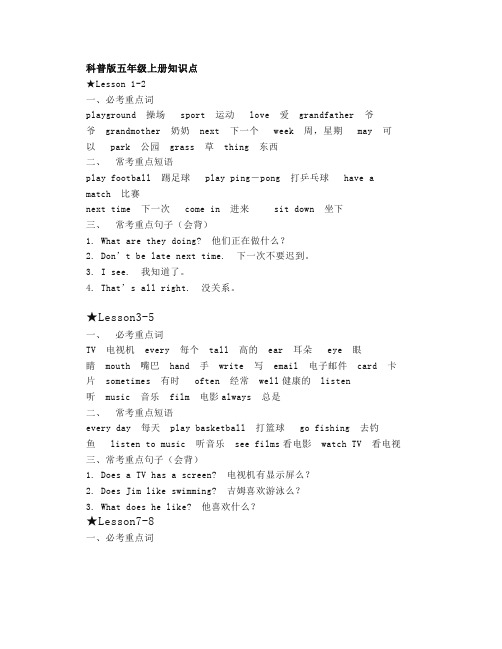
科普版五年级上册知识点★Lesson 1-2一、必考重点词playground 操场 sport 运动 love 爱grandfather 爷爷grandmother 奶奶next 下一个 week 周,星期 may 可以 park 公园grass 草thing 东西二、常考重点短语play football 踢足球 play ping-pong 打乒乓球 have a match 比赛next time 下一次 come in 进来 sit down 坐下三、常考重点句子(会背)1. What are they doing? 他们正在做什么?2. Don’t be late next time.下一次不要迟到。
3. I see. 我知道了。
4. That’s all right.没关系。
★Lesson3-5一、必考重点词TV 电视机every 每个tall 高的ear 耳朵 eye 眼睛mouth 嘴巴hand 手write 写email 电子邮件card 卡片sometimes 有时 often 经常well健康的listen听music 音乐film 电影always 总是二、常考重点短语every day 每天play basketball 打篮球 go fishing 去钓鱼 listen to music 听音乐see films看电影watch TV 看电视三、常考重点句子(会背)1. Does a TV has a screen? 电视机有显示屏么?2. Does Jim like swimming? 吉姆喜欢游泳么?3. What does he like? 他喜欢什么?★Lesson7-8一、必考重点词shop商店buy 买drink 喝juice 果汁 tea 茶feel 感觉much 非常vegetable 蔬菜potato 土豆tomato 西红柿train 火车arm 手臂cry 哭wrong 错误的worry 担心二、常考重点短语would like 想要 a cup of 一杯 a bottle of 一瓶 a glassof 一杯 a bag of 一包三、常考重点句子(会背)1. What would you like? 你想要什么?2. Would you like some tomatoes? 你想要一些西红柿么?3. Could I have some cabbages? 我可以要一些卷心菜么?4. What’s wrong ?怎么了?★Lesson9-11一、必考重点词chicken鸡肉half 一半twenty 20 fruit 水果 know 知道clever 聪明的child 孩子small 小的food 食物back向后its 它的tell 告诉story 故事hear 听见二、常考重点短语how much 多少钱in front of 在……前面say goodbye to 向……道别go shopping 去购物lots of 许多三、常考重点句子(背会)1. How many cakes do you want? 你想要多少蛋糕?2. How much meat do you want? 你想要多少肉?3. There is a horse under the tree. 树下有一匹马。
科普英语五年级上册

科普英语五年级上册一、词汇方面。
1. 动物类。
- 常见动物单词:cat(猫)、dog(狗)、rabbit(兔子)、bird(鸟)、fish (鱼)、mouse(老鼠)等。
- 动物的习性相关词汇:run(跑)、jump(跳)、fly(飞)、swim(游)等。
- 动物身体部位:head(头)、tail(尾巴)、leg(腿)、wing(翅膀)等。
2. 植物类。
- 植物名称:tree(树)、flower(花)、grass(草)、plant(植物)等。
- 植物生长相关:grow(生长)、seed(种子)、root(根)、stem(茎)、leaf(叶子)等。
3. 自然现象类。
- 天气:sun(太阳)、sunny(晴朗的)、cloud(云)、cloudy(多云的)、rain(雨)、rainy(下雨的)、wind(风)、windy(有风的)、snow(雪)、snowy (下雪的)等。
- 季节:spring(春天)、summer(夏天)、autumn(秋天)、fall(美式秋天)、winter(冬天)。
每个季节的特点相关词汇,如warm(温暖的,春天特点)、hot(炎热的,夏天特点)、cool(凉爽的,秋天特点)、cold(寒冷的,冬天特点)等。
二、语法方面。
1. 一般现在时。
- 用法:表示经常发生的动作或存在的状态。
- 结构:- 主语为第三人称单数(he/she/it等)时,动词要加 -s或 -es,例如:He likes reading books.(他喜欢读书。
)- 主语为第一人称(I)、第二人称(you)和复数(we/they等)时,动词用原形,例如:I like apples.(我喜欢苹果。
)We play football on Sundays.(我们在周日踢足球。
)2. There be句型。
- 用法:表示某地有某物。
- 结构:There is/are+名词+地点。
例如:There is a book on the desk.(桌子上有一本书。
科普版五年级上册英语知识点.doc

五年级英语科普版Lesson 1单词及词组playground n.操场sport n.运动love v.爱(loves)grandfather n.爷爷grandmother n.奶奶,外婆next 下一个week n.星期classroom n .教室center n.中心ping-pong n.乒乓球tennis n.网球play football 踢足球play ping-pong 打乒乓球play tennis 打网球have a match竞赛 ride a bike骑自行车 fly a kite 放风筝sports centre 运动中心ride a horse骑马要点语句What is he/she doing? He/She is V-ing(动词ing 形式).What are they doing? They are V-ing.Where is XXX? He/She is + 地点.They are going to have a match with their friends next week.Lesson 2单词及词组may 能够 park n .公园 grass n草. thing n.东西,工作 seat n.座位next time 下一次I see 我知道了要点语句Why are you late? Because the bus was late.Go to your seat and sit down, please.Don’t be late next time. Keep quiet! No spitting!That ’a lsl right. Watch your step! Don’t waste food!Sit down. (Don ’t sit down.) No littering!Lesson 3单词及词组TV n.电视机every 每一个tall adj.高的ear n.耳朵eye n.眼睛mouth n.嘴巴hand n.手write v.写email n.邮件keyboard n.键盘mouse n.鼠标,老鼠every day 每天play with sb. 和⋯一同玩 have a guess猜一猜 write letters 写信要点语句A computer has a keyboard.Does a TV have a mouse? No, it doesn ’t.Does a TV have a screen? Yes, it does.Does he/she ⋯⋯..? Yes, he/she does. No, he/she doesn ’t.Is he/she ⋯⋯..? Yes, he/she is. No, he/she isn ’t.Lesson 4单词及词组card n .卡片 sometimes 有时often常常 well adj.健康的,好skate v.滑冰play basketball 打篮球 go fishing 去垂钓on Sundays在周日in summer 在夏天play cards打纸牌要点语句Does Jim likes swimming? Yes, he does. No, he doesn ’t.Do you like xxxx? Yes, I does. No, I don ’t.What’s your favourite sport?Lesson 5单词及词组listen v.听 listen to ⋯听⋯ music n.音乐film n.电影 always总是only只是,只 everyone 每一个 enjoy v.喜爱,享用 cartoons 卡通listen to music 听音乐see films 看电影 watch TV看电视take photos 摄影 read books读书see TV plays看电视剧要点语句What do you like? I like XXXX.What does he/she like? He/She likes XXXX.What do you like to do in your free time? I like XXX.Lesson 6单词及词组take v.拿 take a look 看一看 let’s=let u让s咱们Let’s go and take a look.Lesson 7单词及词组shop n .商铺 buy v.买drink v.喝 n.饮料 tea n.茶 juice n.果汁feel v.感觉much 多,十分 something 某事物 would 即将 share 共享bottle n.瓶子 carrot n.胡萝卜 would like 想要 a bottle of 一瓶a cup of tea一杯茶 a bottle of coke 一瓶可乐a glass of water一杯水要点语句What would you like? I ’d like some tea.Can I help you? = What can I do for you?Would you like ⋯⋯⋯? Yes, please. No, thanks.Here you are.How are you feeling? I ’m not feeling well.Lesson 8单词及词组vegetable n.蔬菜 potato n.马铃薯 train n.火车arm n.手臂 cry v.哭喊wrong adj.过错的 worry v.忧虑could 能够 money n.钱ticket n.票take a train 坐火车a ticket to去⋯的票要点语句We want some vegetables.Would you like some potatoes? Yes, please.Could I have some tomatoes, too? Sure.How much are they?There is some bread in the fridge.No hot dogs for you.He wants to take a train to Anshan.What’s wrong? Don’t worry.Lesson 9单词及词组chicken n.鸡,鸡肉 half 一半 twenty 二十 fruit n. 生果 know v.知道clever adj.聪明的anything 任何事物else其他的kilo 千克show n.展现 how much 多少钱要点语句How many cakes do you want?对( 可数名词提问) Four.How much chicken do you want? (对不可数名词提问) I want half akilo.Here you are. Here it is.Here is the money.Lesson 10单词及词组child n.儿童(复数children)small adj.小的food n. 食物back 向后,背 its 它的 forest n.森林 village n.村庄,村庄 other其他,其他的in front of 在⋯前面say goodbye to向⋯道别go back to回到要点语句What ’s in front of the hou?seWhat are behind the house?There is + a/an +名词单数+ 地点。
五年级上册科普版英语单词默写表(单词表+英译汉+汉译英)(12页)

[saʊnd]
11
到处
['evrɪhweə]
11
购物
11
许多,大量
12
冰激凌
12
牛奶
[mɪlk]
12
警察
[pə'liːs]
12
停留
[steɪ]
12
贼
[θiːf]
12
敲
[nɒk]
12
顺便问一下
五年级上册(英译汉)
单元
英文
中文
音标
1
playground
['pleɪgraʊnd]
1
sport
[spɔːt]
10
村庄,乡村
['vɪlɪdʒ]
10
别的,其他的
['ʌðə]
10
在……前面
10
向……道别
11
告诉
[tel]
11
故事
['stɔːri]
11
听见
[hɪə]
11
电冰箱
[frɪdʒ]
11
也不
['iːðə]
11
家乡,故乡
['hom'taʊn]
11
岛
['aɪlənd]
11
海
[siː]
11
钢琴
[pɪ'ænəʊ]
11
科普版五年级上册英语单词默写表(单词表+英译汉+汉译英)
五年级上册(单词表)
单元
英文
中文
音标
1
playground
操场
['pleɪgraʊnd]
1
科普版英语五年级上册重点
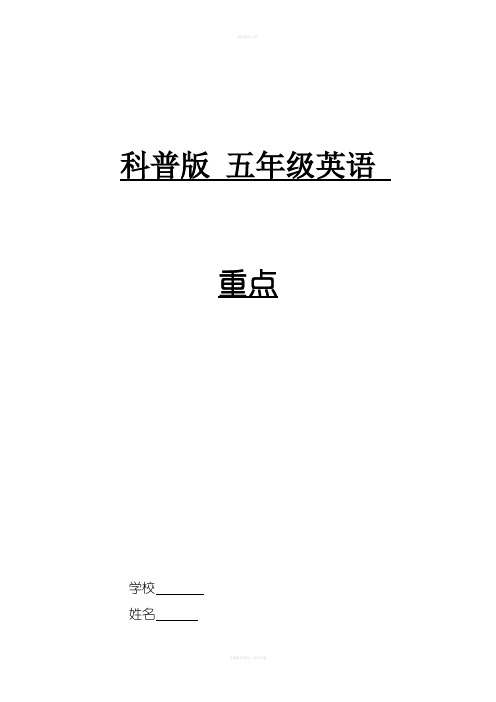
科普版五年级英语重点学校姓名Don’waste food(请勿浪费粮食),No smoking(请勿吸烟),No parking(请勿停车),Be late for school/calss ,in the park , on the grass,the right thing , a fine day2.列子:May I come in? (May的一般疑问句)肯定回答:Yes,plese.否定回答:Sorry,you can’t. /No,you can’t.Lesson 3 A computer has a keyboard1.主题词:have和has用法Has用于第三人称单数(she,he,it或单数名词)Have用于第一人称单数(I,we),第二人称(you)和第三人称复数(they和其他复数名词、并列主语)have和has与主语搭配:I SheWe HeYou have…It has…They The boyTony and Jenny Jenny可见,主语为第三人称单数时用has,其余人称都用have。
3.句型:陈述句:he/She/it/ +has / I/we/you/they/ +have否定句:主语+don’t have/主语+ doesn’t have一般疑问句:Do/ Does + 主语+ have肯定回答:Yes, …do/ does.否定回答:No, …don’t/ doesn’t.4.句子:Does a TV have a screen? Yes, it does./No, it doesn’t.Lesson 31、TV 电视机2、every 每一个3、tall 高的4、ear 耳朵5、eye 眼睛6、mouth 嘴7、hand 手8、write 写同音词是right9、email 电子邮件10、keyboard 键盘11、mouse 鼠,鼠标12、every 每天。
五年级上册英语科普版单词表

五年级上册英语科普版单词表五年级上册英语科普版单词表如下:Lesson 1playground ['pleigraund] 操场sport [spɔ:t] 运动love [lʌv] 爱grandfather ['gærnfɑ:ðə] 爷爷,外公(grandpa ['gærnpɑ:])grandmother ['gærnm ʌðə] 奶奶,外婆(grandma ['gærnmɑ:])next [nekst] 下一个week [wi:k] 星期classroom ['klɑ:sru:m] 教室centre ['sentə] 中心ping-pong ['piŋ'pɔŋ] 乒乓球tennis ['tenis] 网球play football 踢足球play ping-pong 打乒乓球have a match 比赛Lesson 2may [mei] 可以park [pɑ:k] 公园;停车grass [grɑ:s] 草thing [θiŋ] 东西,事情seat [si:t] 座位next time 下一次I see. 我知道了That's all right. 没关系.Lesson 3TV [ti:'vi:] 电视机every [i:tʃ] 每一个tall [tɔ:l] 高的ear [iə] 耳朵eye [ai] 眼睛mouth [mauθ] 嘴hand [hænd] 手write [wrait] 写email ['i:meil] 电子邮件keyboard ['ki:bɔ:d] 键盘mouse [maus] 鼠标,鼠every day 每天Lesson 4card [kɑ:d] 卡片sometimes ['sʌmtaimz] 有时often ['ɔfn] 经常well [wel] 健康的;好skate [skeit] 滑冰play basketball 打篮球go fishing 去钓鱼Lesson 5listen ['lisn] 听music ['mju:zik] 音乐film [film] 电影always ['ɔ:lweiz] 总是only ['əunli] 仅仅,只everyone ['evriwʌn] 每一个enjoy [in'dʒɔi] 喜欢,享受listen to music 听音乐see films 看电影watch TV 看电视Lesson 6take [teik] 拿take a look 看一看Lesson 7shop [ʃɔp] 商店buy [bai] 买drink [driŋk] 喝;饮料tea [ti:] 茶juice [dʒu:s] 果汁feel [fi:l] 感觉much [mʌtʃ] 对,非常something ['sʌmθiŋ] 某事(物)would [wud] 将要bottle ['bɔtl] 瓶子carrot ['kærət] 胡萝卜would like 想要a cup of 一杯a bottle of 一瓶Lesson 8vegetable ['vedʒitəbl] 蔬菜potato [pə'teitəu] 土豆tomato [tə'mɑ:təu] 西红柿train [trein] 火车arm [ɑ:m] 手臂cry [krai] 哭,嗨wrong [rɔŋ] 错误的worry ['wʌri] 担忧could [kud] 可以money ['mʌni] 钱ticket ['tikit] 票What's wrong?怎么了?Lesson 9chicken ['tʃikən] 鸡,鸡肉half [hɑ:f] 一半twenty ['twenti] 二十fruit [fru:t] 水果know [nəu] 知道clever ['klevə] 聪明的anything ['eniθiŋ] 任何事物else [els] 其他的kilo ['keiləu] 千克show [ʃəu] 展示how much 多少(钱)What can I do for you?我能帮你做什么吗?Lesson 10child [tʃaild] 儿童(复children ['tʃildən])small [smɔ:l] 小的food [fu:d] 食物back [bæk] 向后;背its [its] 它的forest ['fɔrist] 森林village ['vilidʒ] 村庄,乡村other ['ʌðə] 别的,其他的in front of 在……前面say goodbye to 向……道别Lesson 11tell [tel] 告诉story ['stɔri] 故事hear [hiə] 听见fridge [fridʒ] 电冰箱either ['aiðə] 也不hometown ['həumtaun] 家乡,故乡island ['ailənd] 岛sea [si:] 海piano [pi'ænəu] 钢琴sound [saund] 声音everywhere ['evriwɛə] 到处go shopping 购物lots of 许多,大量Lesson 12ice cream [ˌais'kri:m] 冰激凌milk [milk] 牛奶police [pə'li:s] 警察stay [stei] 停留thief [θi:f] 贼knock [nɔk] 敲by the way 随便问一下。
五年级上册科普版英语单词

五年级上册科普版英语单词一、Unit 1。
1. young [jʌŋ] adj. 年轻的;幼小的。
2. funny [ˈfʌni] adj. 滑稽的;可笑的。
3. tall [tɔːl] adj. 高的。
4. strong [strɒŋ] adj. 强壮的。
5. kind [kaɪnd] adj. 和蔼的;亲切的;宽容的。
6. old [əʊld] adj. 年老的;旧的。
7. short [ʃɔːt] adj. 短的;矮的。
8. thin [θɪn] adj. 瘦的。
二、Unit 2。
1. Monday [ˈmʌndeɪ] n. 星期一。
2. Tuesday [ˈtjuːzdeɪ] n. 星期二。
3. Wednesday [ˈwenzdeɪ] n. 星期三。
4. Thursday [ˈθɜːzdeɪ] n. 星期四。
5. Friday [ˈfraɪdeɪ] n. 星期五。
6. Saturday [ˈsætədeɪ] n. 星期六。
7. Sunday [ˈsʌndeɪ] n. 星期日。
8. weekend [ˌwiːkˈend] n. 周末。
9. wash [wɒʃ] v. 洗。
10. watch [wɒtʃ] v. 看;观看。
11. do [duː] v. 做;干;助动词(无词义)12. read [riːd] v. 读;阅读。
三、Unit 3。
1. sandwich [ˈsænwɪtʃ] n. 三明治。
2. salad [ˈsæləd] n. 沙拉;凉拌生菜。
3. hamburger [ˈhæmbɜːɡə(r)] n. 汉堡包。
4. ice cream [ˌaɪs ˈkriːm] n. 冰淇淋。
5. tea [tiː] n. 茶;茶水。
6. fresh [freʃ] adj. 新鲜的。
7. healthy [ˈhelθi] adj. 健康的;有益健康的。
五年级英语科普版

五年级英语科普版一、单词。
1. 动物类。
- cat(猫),复数形式为cats。
例如:I have a cat.(我有一只猫。
)- dog(狗),复数dogs。
如:There are two dogs in the yard.(院子里有两只狗。
)- monkey(猴子),复数monkeys。
“The monkeys are very naughty.”(这些猴子非常淘气。
)- elephant(大象),复数elephants。
“An elephant has a long nose.”(大象有一个长鼻子。
)2. 食物类。
- apple(苹果),复数apples。
“I like to eat apples.”(我喜欢吃苹果。
)- banana(香蕉),复数bananas。
“There are some bananas on the table.”(桌子上有一些香蕉。
)- bread(面包),不可数名词。
“I have some bread for breakfast.”(我早餐吃一些面包。
)- milk(牛奶),不可数名词。
“Drinking milk is good for our health.”(喝牛奶对我们的健康有益。
)3. 日常用品类。
- pen(钢笔),复数pens。
“My pen is red.”(我的钢笔是红色的。
)- book(书),复数books。
“There are many books in the library.”(图书馆里有许多书。
)- chair(椅子),复数chairs。
“The chairs are in the classroom.”(椅子在教室里。
)- table(桌子),复数tables。
“Put the book on the table.”(把书放在桌子上。
)二、语法。
1. 一般现在时。
- 概念:表示经常发生的动作或存在的状态。
- 结构:- 主语是第三人称单数(he/she/it等)时,动词要用第三人称单数形式(一般在动词原形后加 -s或 -es)。
英语重点五年级下册科普版 重点总结

英语重点五年级下册科普版重点总结《英语重点五年级下册科普版》重点总结如下:1. 主题单元- Unit 1: The Little Scientist这个单元介绍了科学家以及他们的工作和成就。
学生将学习到一些著名科学家的名字,了解他们对科学研究的贡献,以及他们的发明和发现。
- Unit 2: The Water Planet这个单元介绍了地球上水的重要性以及水的循环过程。
学生将学习到关于地球上的水资源的知识,包括各种水体的特点、水的循环过程以及我们应该如何保护和节约水资源。
- Unit 3: The Living World这个单元介绍了地球上的生物多样性以及生物之间的相互关系。
学生将学习到关于不同类型的生物以及它们之间的关系的知识,还将了解到一些生物保护的方法。
- Unit 4: The Energy We Need这个单元介绍了能源的重要性以及可再生能源和非可再生能源的区别。
学生将学习到关于不同类型能源的知识,以及如何正确使用和保护能源。
- Unit 5: The Earth in Space这个单元介绍了地球在太空中的位置和行为。
学生将学习到太阳系的一些基本知识,了解地球的自转和公转、四季的变化以及月亮的形成和运动等。
2. 重点词汇这些单元中的重点词汇主要涵盖了与科学和科技相关的词汇,如科学家的姓名、科学实验和发现的词汇、自然界中的各种生物名称等。
3. 语法要点在这些单元中的语法要点主要关注于一般现在时、一般过去时和一般将来时的用法,以及一些常见的使用频率副词和连词的句型。
4. 阅读和听力训练在每个单元中都有相关的阅读和听力训练,旨在培养学生的阅读理解和听力理解能力,帮助他们更好地理解和运用所学知识。
总的来说,《英语重点五年级下册科普版》主要包含了科学和科技方面的知识,通过丰富多样的语言活动和实践,帮助学生增加对自然和科学世界的认知,培养他们的科学思维能力和跨学科的学习能力。
- 1、下载文档前请自行甄别文档内容的完整性,平台不提供额外的编辑、内容补充、找答案等附加服务。
- 2、"仅部分预览"的文档,不可在线预览部分如存在完整性等问题,可反馈申请退款(可完整预览的文档不适用该条件!)。
- 3、如文档侵犯您的权益,请联系客服反馈,我们会尽快为您处理(人工客服工作时间:9:00-18:30)。
Each living thing uses its adaptations for survival.
Can you find some and share with me?
Thank you !
Let’s see some adaptations and answer what kinds of adaptations they are.
1.The porcupine 2. A turtle’s shell protects
uses its quills for it from being eating by
Behavioral Adaptations
Some adaptations have to do with an animal’s acts or behaves. These are Behavioral Adaptations.
For example, Most birds migrate to find food and a place to lay eggs.
defense.
other animals.
They are both physical adaptations.
1. Almost all owls hunt at night.
2. Animals hibernate to conserve energy and avoid a food shortage.
Physical Adaptations
Some adaptations have to do with an animal’s body or a plant’s structure. These are Physical Adaptations.
For example, the thick, waxy stem of a cactus allows the plant to store water in the desert.
Animal’s adaptation
Zhuyuan Primary School Class6 Grade5 Eric Jiang
Look at this picture. It is an owl. We can see the following facts about owls:
• Owls‘ eyes are useful for seeing well at night;
• Their feathers have soft edges that allow them to fly silently;
• Owls’ sharp claws are useful for hunting.
Each of these things is an adaptation.
An adaptation is a characteristic that helps a living thing survive.
